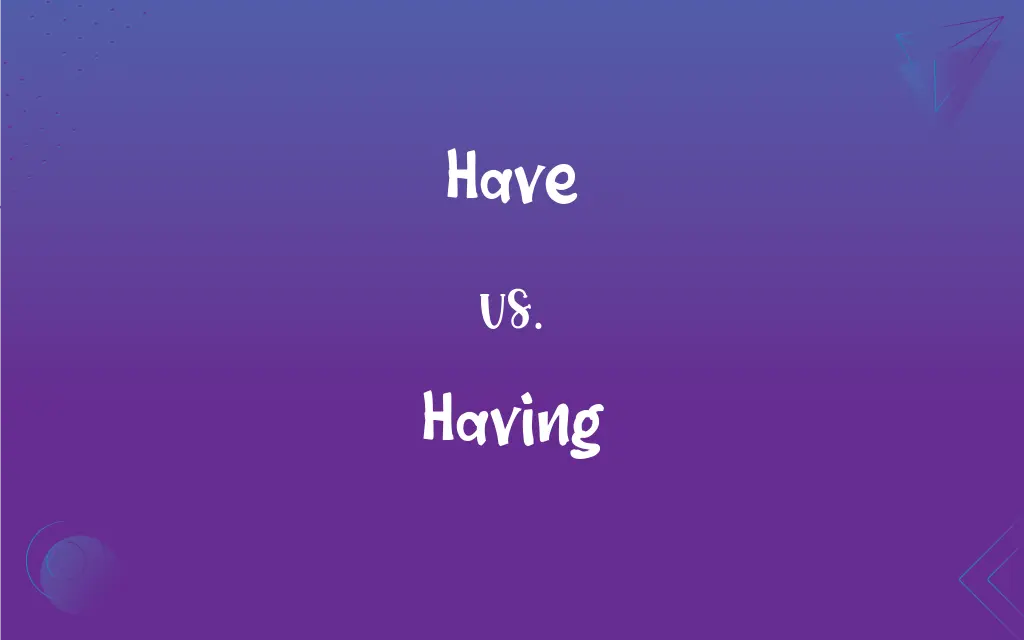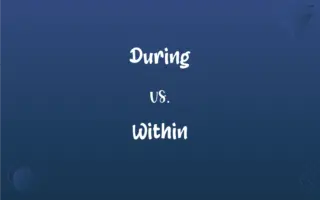Have vs. Having: What's the Difference?
Edited by Harlon Moss || By Janet White || Updated on November 11, 2023
"Have" is a verb indicating possession, ownership, or necessity, while "having" serves as a gerund or present participle, often implying the action of possessing or experiencing.

Key Differences
"Have" is primarily used as a main verb to denote possession, ownership, or the need for something. "Having," on the other hand, is the present participle form of 'have' and is often used in continuous tenses or as a gerund to describe ongoing actions.
In sentences, "have" functions as a main verb, such as in expressing relationships, experiences, or states of being. However, "having" is used in progressive tenses to describe ongoing actions, and as a gerund, it can function as a noun.
"Have" can also be used as an auxiliary verb in forming perfect tenses. Whereas, "having," when used at the beginning of a clause, can imply a reason or a condition, as in "having considered all options..."
In the context of obligations or necessities, "have" is commonly used, such as in "have to do something." "Having" can also express the action of experiencing or undergoing something, as in "having a great time."
"Have" can denote an action in the simple aspect, while "having" often suggests a continuous or ongoing aspect of the same action.
ADVERTISEMENT
Comparison Chart
Function
Main verb for possession, need, or auxiliary for perfect tenses
Present participle or gerund for ongoing actions or states
Example Usage
"I have a car."
"Having a car is convenient."
Tense
Simple present or past
Present continuous or gerund form
Context
Expresses ownership, relationships, experiences
Used for ongoing actions, conditions, experiences
Grammatical Role
Main verb or auxiliary verb
Part of verb phrase or acting as a noun
ADVERTISEMENT
Have and Having Definitions
Have
Used as an auxiliary verb to form perfect tenses.
I have finished my work.
Having
The action of possessing or owning something, used as a gerund.
Having a pet requires responsibility.
Have
To experience or undergo a particular condition or situation.
They have dinner at 8 pm.
Having
Experiencing or undergoing a particular condition, used in continuous tenses.
She is having a hard time solving the puzzle.
Have
To possess, own, or hold something.
She has a beautiful house.
Having
Serving as a present participle to describe an ongoing action.
They are having dinner right now.
Have
To hold or maintain something in a particular state.
He has his hair cut short.
Having
Introducing a clause to express a reason or condition.
Having received all the applications, the committee will make a decision.
Have
To be obliged or need to do something.
You have to wear a helmet while biking.
Having
Used to describe the action of partaking in something.
He's having a great time at the concert.
Have
To be in possession of
Already had a car.
Having
To be in possession of
Already had a car.
Have
To possess as a characteristic, quality, or function
Has a beard.
Had a great deal of energy.
Having
To possess as a characteristic, quality, or function
Has a beard.
Had a great deal of energy.
Having
To possess or contain as a constituent part
A car that has air bags.
FAQs
Can 'have' express necessity?
Yes, 'have' can express necessity, as in "You have to see this movie."
How is 'having' used in a sentence?
'Having' is used to describe ongoing actions or states, often in continuous tenses or as a noun.
Is 'having' always a verb?
'Having' can be a verb (present participle) or a gerund (noun).
What does 'have' mean?
'Have' means to possess, own, or experience something.
What does 'have got' mean?
'Have got' is an informal way of saying 'have,' mostly used for possession.
What is the past tense of 'have'?
The past tense of 'have' is 'had.'
Can 'having' start a clause?
Yes, 'having' can start a clause to express a reason, as in "Having considered the options..."
Can 'have' indicate an action?
Yes, 'have' can indicate actions, like "have dinner."
How does 'having' function as a gerund?
As a gerund, 'having' functions like a noun, as in "Having a good time is important."
Does 'having' imply ongoing action?
Yes, 'having' often implies an ongoing or continuous action.
Is 'have to' used for obligations?
Yes, 'have to' is commonly used to express obligations.
How is 'have' used in expressions?
'Have' is used in expressions like "have a look" or "have a try."
Is 'have' used in perfect tenses?
Yes, 'have' is used as an auxiliary verb in perfect tenses.
Is 'having' used in continuous forms?
Yes, 'having' is used in continuous verb forms, like "She is having a party."
Can 'having' be replaced with 'having got'?
'Having got' is less common and more informal, typically not used in place of 'having.'
What does 'having fun' mean?
'Having fun' means experiencing or enjoying amusement or pleasure.
Is 'have' a modal verb?
No, 'have' is not a modal verb; it's a main or auxiliary verb.
Can 'have' be used with objects?
Yes, 'have' is often used with objects, as in "I have a book."
How does 'having' work in perfect continuous tense?
In perfect continuous tense, 'having' indicates a continuous action in the past, as in "Having been working for hours, she took a break."
Can 'having' describe experiences?
Yes, 'having' can describe experiences, as in "He's having a hard time."
About Author
Written by
Janet WhiteJanet White has been an esteemed writer and blogger for Difference Wiki. Holding a Master's degree in Science and Medical Journalism from the prestigious Boston University, she has consistently demonstrated her expertise and passion for her field. When she's not immersed in her work, Janet relishes her time exercising, delving into a good book, and cherishing moments with friends and family.
Edited by
Harlon MossHarlon is a seasoned quality moderator and accomplished content writer for Difference Wiki. An alumnus of the prestigious University of California, he earned his degree in Computer Science. Leveraging his academic background, Harlon brings a meticulous and informed perspective to his work, ensuring content accuracy and excellence.































































